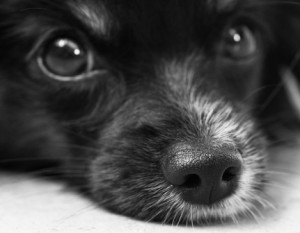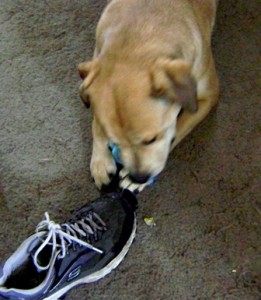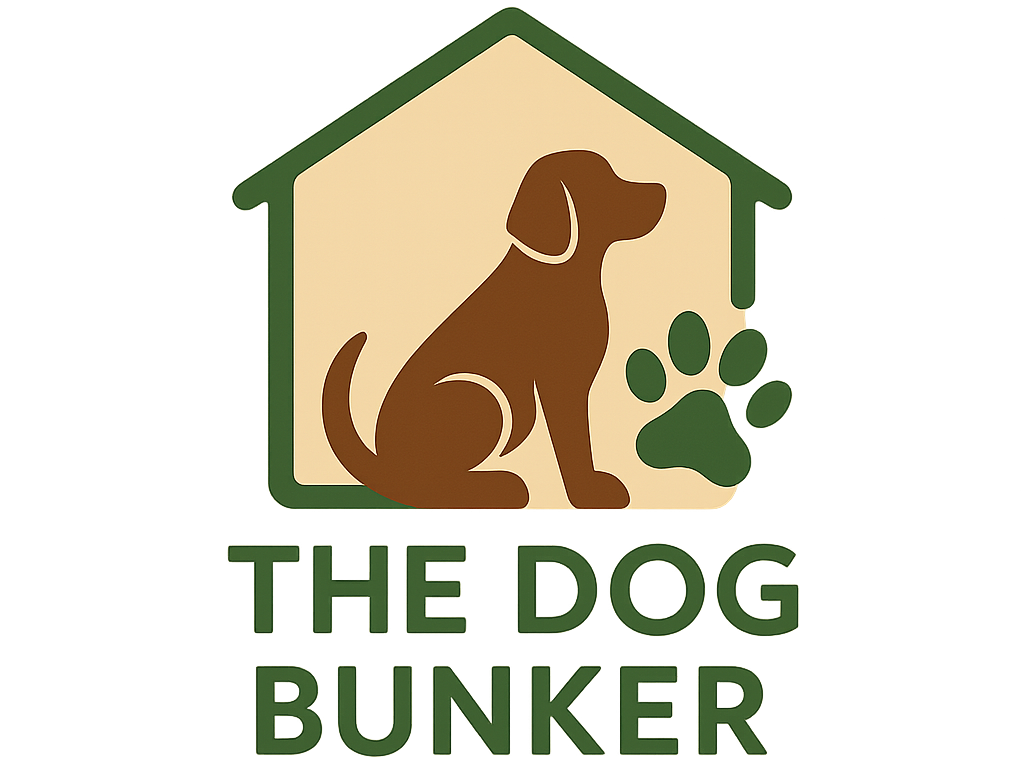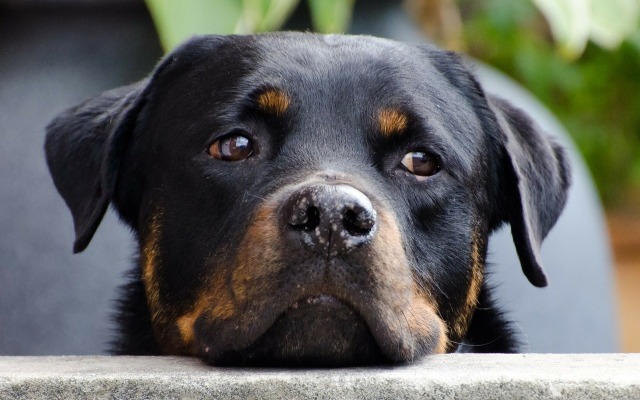Is It Possible To Calm Dog Separation Anxiety?
I’d say it’s possible, at least to a point, depending on how bad your dog has it.
It may take a lot of patience and time, but there are ways to make it at least a bit better for your dog…and you.

I know it’s hard to see your best furry friend going through such stress. Plus, it’s no fun dealing with the mess either!
Separation anxiety is a common problem many dog owners face with their dogs. It can range from a mild to severe case.
Dog Anxiety Symptoms
Since some dogs have separation anxiety only to a mild degree and others may have it to an extremely severe degree there’s many different symptoms to look for. But, of course almost all of these occur when the owner leaves home, except for one that I can think of…
I’ll tell you more about that later though…but first,
When your dog is constantly destroying things in your home while you’re gone, I’d consider it a BIG problem! I’ve had the experience of coming home to disaster.…
Shoes chewed up, doors and door frames clawed to pieces,
blinds torn off the windows….
all from one little puppy, lol!
Fortunately, our four dogs aren’t that bad anymore. In fact, most of our dogs didn’t go to the extremes of tearing blinds off the windows. The first pup we had many years ago did all that damage all by his lil’ ole self.
Well, it was a lesson well learned from that puppy we named Thor. We learned a lot as we raised him and he eventually grew up to be a very good dog. Since then we’ve had quite a few other puppies and did things a bit differently with them.
We learned how to teach them it’s okay to be alone for awhile… and you can too!
What Does Your Dog Do While You’re Gone?

If it just lays down quietly or goes to chew on a chew toy while you’re gone, GREAT!
But, if it’s doing some or all of the symptoms below, it may have separation anxiety issues.
Common Symptoms
- Barking & howling
- Pacing
- Drooling
- Chewing on everything
- Urinating and you know….those lovely brown gifts they leave around the house
- Excessive panting
- Trying to escape
- Constantly follows its “person” when they are home
These all may be signs your dog has separation anxiety, but it’s also a good idea to rule out other problems first.
Many of these symptoms can also be a sign of your dog having a medical problem, and not separation anxiety. If these are occurring when you’re at home too, it would be a good idea to have your dog checked out by a veterinarian.
What Causes Separation Anxiety in Some Dogs & Not Others?
What exactly causes some dogs to have separation anxiety is still yet to be found it seems. There’s no one size fits all answer to this one, but there’s a few things which could contribute to the problem.
- Traumatic experience
- Abandoned or left at a shelter
- Changes in family – new family member or family member left
- Changes in routine
- Owner constantly petting, talking to, or coddling dog
- Lack of training
- Health problems
- Medications
- Lack of exercise
- Boredom
These are just a few things that could cause separation anxiety in your dog. It could even be a mixture of many small things…at least to us they may seem no big deal, but it may be a different story for your dog.
Think about these things and how or if any of these may apply to your dog. It’s also always a good idea to make sure your dog gets plenty of exercise, proper food and water, and vet checkups.
Do Medications Work to Stop Separation Anxiety in Dogs?
There are medications and supplements that may help, especially in extreme cases, but I’d definitely take the advice of your veterinarian on using any medication. I’ve heard of medication helping in some dogs, but with other dogs it may make them even worse.
I’d say if you go by your veterinarian’s advice and also try properly training your dog, exercising your dog, and using positive reinforcement for good behavior.
Don’t reward your dog with attention and treats for behaviors you don’t want such as whining, barking, howling, jumping on you, etc.
Only reward your dog for good behaviors! If its doing something you want it to be doing, then give it a reward.
Are You Causing Your Dog to Have Anxiety?
Dogs do realize there’s a pattern to what you’re up to. Did you know that?
They know when you’re about to leave them….
Dogs aren’t stupid…
Maybe some people may disagree, but those people probably aren’t reading this anyway!
I’ve lived with dogs all my life, and I know they know what I’m up to! Each and every day, whether it’s my day off or not.
They see me doing the same things every morning before I leave…so they’ve learned my routine. And they’re okay with that. They know I’ll be back. Other mornings, they see I’m doing the same things I do when I’m going to be home.
So, no, dogs aren’t stupid! They watch and listen. Even when you think they aren’t.
Dogs pick up on your moods too, at least that’s my opinion. If you’re acting all stressed out and running around in a craze getting ready to leave for work or wherever you’re going, it’s more than likely you’re the culprit!
Well, maybe you’re not totally the cause of it, but you’re adding to the problem….your dog is watching you running around the house like a deranged lunatic and probably thinking,
“What’s wrong? What’s going on…something’s upsetting my human!
Did I do something? Why are they ignoring me?
Well, I should do something too! Something to get their attention…”
Act calm around your dog and maybe even change your routine up a bit if your dog suffers from separation anxiety. Mine used to have an issue with me leaving, but they’ve gotten a lot better by doing a few small things a little differently once in awhile and not making a big deal of leaving.
Steps You Can Take to Help Your Dog with Separation Anxiety
- Don’t make a fuss when you leave or come home – leave quietly and come home quietly. If your dog is jumping all over the place and going crazy, barking, etc. ignore it….until it stops. Don’t say a word, don’t look at your dog either. Not until it’s calm. Then reward it. When it’s doing something you want…being calm and quiet.
- Proper exercise – bring your dog for a walk before you leave
- Proper crate training – at least for many dogs helps, but if your dog has severe separation anxiety it may not. It all depends on whether your dog enjoys being in its crate or not.
- Give your dog something to do while you’re gone – a chew toy that won’t break off in pieces will usually keep it busy for awhile
- Slowly get your dog used to being alone – It’s best to start as a pup, but old dogs can learn too. Start out a few minutes at a time and give it something it loves to eat while you’re gone and see how it goes. Make sure it’s something they’ll eat in two or three minutes and then come back in a few minutes.
- Gradually add more time to this depending how your dog is doing. Eventually you may want to use a refillable chew toy filled with your dog’s favorite food or snack. Once you come back, take the chew toy away so your dog will only associate this really good thing with you being gone.
- Use a calming medication with the advice of your veterinarian, especially with dogs experiencing severe separation anxiety. There are a wide variety of these, some are derived from natural ingredients, while others may have man made ingredients.
Every dog is different and may respond to some things better than others.
Be patient. Be calm. it’ll work out if you give your dog a chance.
Watch your dog’s reactions to things….
and always think about what YOU are doing that could be affecting your dog’s anxiety or not. Don’t you think you’d be stressed out if you seen someone you looked up to running around, maybe even yelling, and banging things around?
And, how would you feel if that someone all of a sudden starts paying all this attention to you, making a big fuss over you every time they’re going to leave….I’d be confused! What’s all the fuss and bother about?
And, well, maybe I’d be thinking they’re leaving for good too. Or, at least a really long time!
Got any suggestions you’d like to add? I’d love to hear them! Please leave any comments or questions you may have in the comment box below!
Thanks for reading! Found this helpful and enjoyed reading it? Then by all means, please share it with your friends!
Take care and best wishes to you and your furry friends! 🙂 -Sherry
You might want to find more info on dogs with separation anxiety here on the ASPCA’s site. I found it quite helpful to learn more about it myself.


I think the thing that perpetuate separation anxiety most the time is that dog owners tend to over-do it even before the anxiety sets in. They attend to every little things – literally serving their dogs from feeding to bed time.
While it’s good for positive bonding, it’s not when the dog needs to be left alone at home or being examined at the vet. They have developed the notion that without the presence of their human, they are doomed. It’s a pity that the dogs should feel that insecure when the people around are just trying to care for it.
Always train from puppy hood and read guides on how to raise a calm pet. Once the anxiety solidify, it’s very hard to reverse even with medication.
Hi Cathy,
I couldn’t agree more… Very good advice! There’s a lot of dog owners out there that overdo it with the affection and attention…even when their dog isn’t behaving well. It’s only teaching them it’s going to get rewarded with more attention and affection no matter what they do. Once a dog has developed bad behaviors and anxiety problems it certainly is a lot harder to change them.
Thanks for stopping by and commenting!
Best wishes 🙂